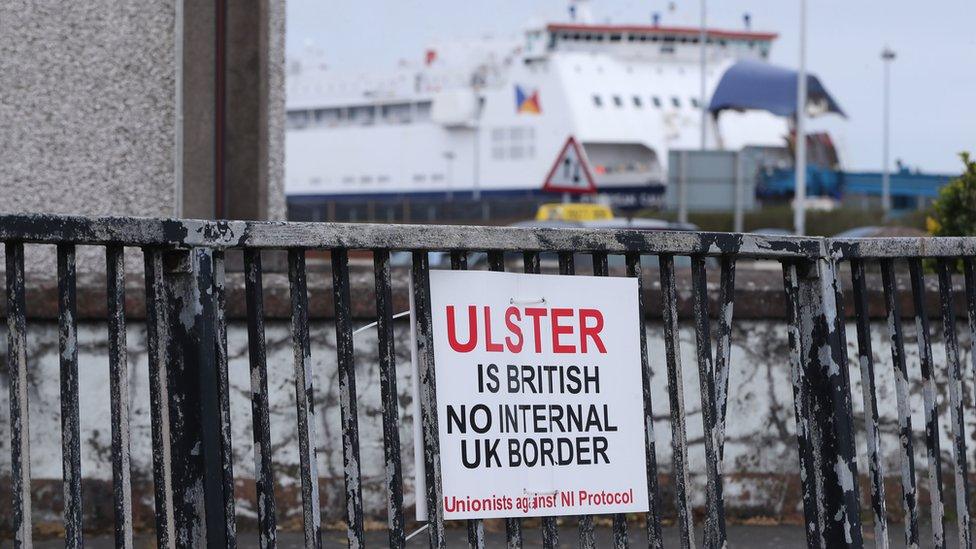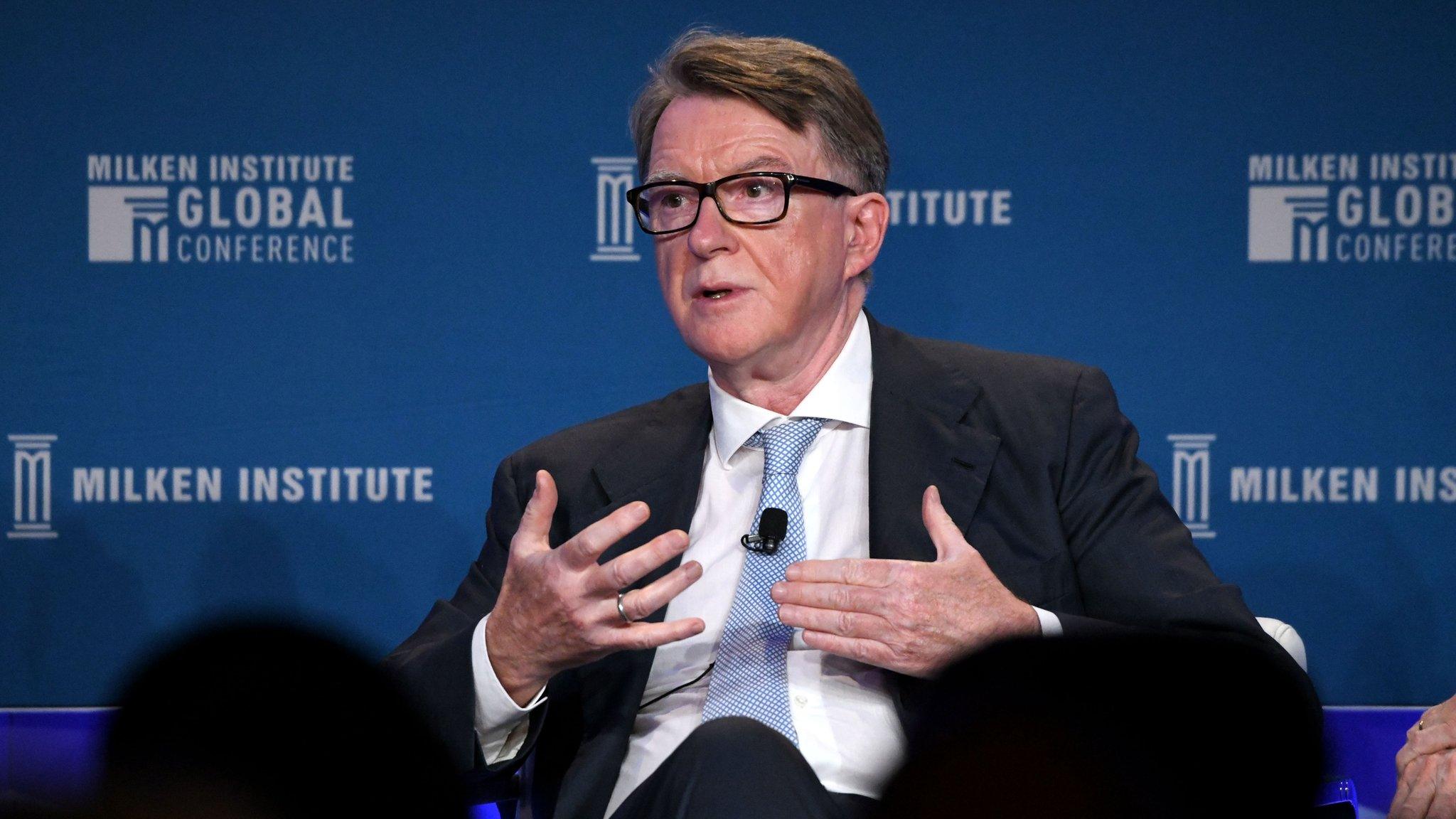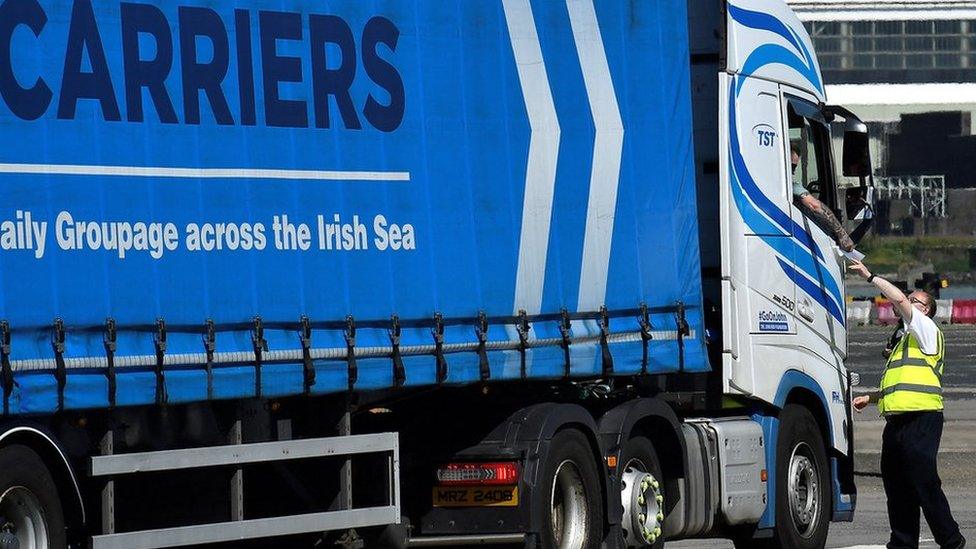Northern Ireland Protocol: Full implementation 'could grind trade to a halt'
- Published

Under the protocol, checks are required on goods coming into Northern Ireland from the rest of the UK
Full implementation of the Northern Ireland Protocol would see trade from Great Britain to Northern Ireland grind to a halt within 48 hours, a major haulage company has warned.
Paul Jackson, from McBurney Transport, described the Irish Sea trading arrangements a "complete disaster".
He was giving evidence to a House of Lords committee in Belfast on Friday.
Mr Jackson said the protocol was reducing choice and increasing prices for consumers in Northern Ireland.
He was one of several business figures who told the committee that they had been negatively affected by the protocol.
The protocol keeps Northern Ireland in the EU's single market for goods, avoiding the need for a hard border with the Republic of Ireland after Brexit.
Special trading arrangements were required for Northern Ireland because of its land border with the Republic of Ireland, which is in the EU.
McBurney Transport, which employs 800 people and has an annual turnover of £130m, is one of the biggest shipper of goods on the island of Ireland.
Based in Ballymena, County Antrim, the firm carries 105,000 trailers across the Irish Sea annually.
Mr Jackson said the protocol "simply does not work for our customers".
"There is a reduction in choice and there is an increase in costs, because we can see what manufacturers are sending into Northern Ireland on a daily basis and every week that reduction in choice becomes more and more apparent," he added.
Mr Jackson said that even with grace periods in operation, the red tape was causing major problems for his industry.
"Rigorous implementation - I often say to myself, go ahead do it, pull the trigger and have rigorous implementation but make sure anybody in this country has been out and their freezers are full, because you will bring a logistics solution to Northern Ireland on its knees within 48 hours, because the east-west movement of traffic will stop," he said.
"So that is the solution of full implementation that the EU are talking about."
He said McBurney Transport had had to build an extension at its headquarters in Ballymena to house 10 staff to deal with protocol paperwork.
'Absolute farce'
Mr Jackson said many businesses in Northern Ireland were also now at a competitive disadvantage to those in Britain.
He stressed that physical checks at the ports were not the issue - rather the paperwork required by the protocol.
All commercial goods being shipped to Northern Ireland from Great Britain need a customs declaration and agri-food products need additional certification.
So-called grace periods mean that agri-food requirements agreed in the protocol have never been implemented in full.
Mr Jackson said McBurney Transport has only had nine vehicles checked in the 21 months.
"Unfortunately, our local media, our local MLAs [assembly members] talk about vehicle checks. It's not vehicle checks, it's the paperwork and the absolute farce and bureaucratic mess of paperwork having to be done in the background. It's all time, it's all cost and it's all money.
"Somebody has to pay for it. Unfortunately, a large percentage of our customers in GB have just decided that Northern Ireland is only 2% of their overall sales process and they just said 'you know what, we're not going to supply'."
He added: "This is 21 months later, and we are banging our head off brick walls watching the bureaucratic mess imposed upon us as hauliers, that we're having to impose on our customers to make this work."

While the protocol is causing difficulties for hauliers, in particular, some other sectors, such as dairy production, say it has been important for the continuity of their business.
There is also little evidence that increased costs are being passed through to consumers.
Data from the ONS, external covering January to June this year suggests little difference in consumer price inflation in Northern Ireland compared to the UK as a whole.
Since October last year, the EU has accepted that the protocol is causing problems for businesses and has proposed measures to reduce checks and simplify paperwork.
However the UK government says these proposals do not go far enough and is advancing legislation which would fundamentally change the operation and oversight of the protocol.

An assembly election could happen on 15 December and cost about £6.5m
The Democratic Unionist Party (DUP) and other unionist parties object to trade barriers being erected between Northern Ireland and the rest of the UK.
The Northern Ireland Executive has not fully functioned since February, when the DUP pulled its first minister out of office in protest over the protocol.
The deadline to restore power-sharing is 00:01 on 28 October or, legally, a fresh poll must be called.
Brian Dougherty, from the North West Cultural Partnership, told the Lords committee that unionists did not feel their voices were being heard, and that the protocol had left "a very vulnerable disconnect".
The committee also heard a claim that the majority of young people "hadn't a clue" what the protocol was.
- Published20 October 2022

- Published10 October 2022

- Published2 February 2024

- Published16 September 2022
